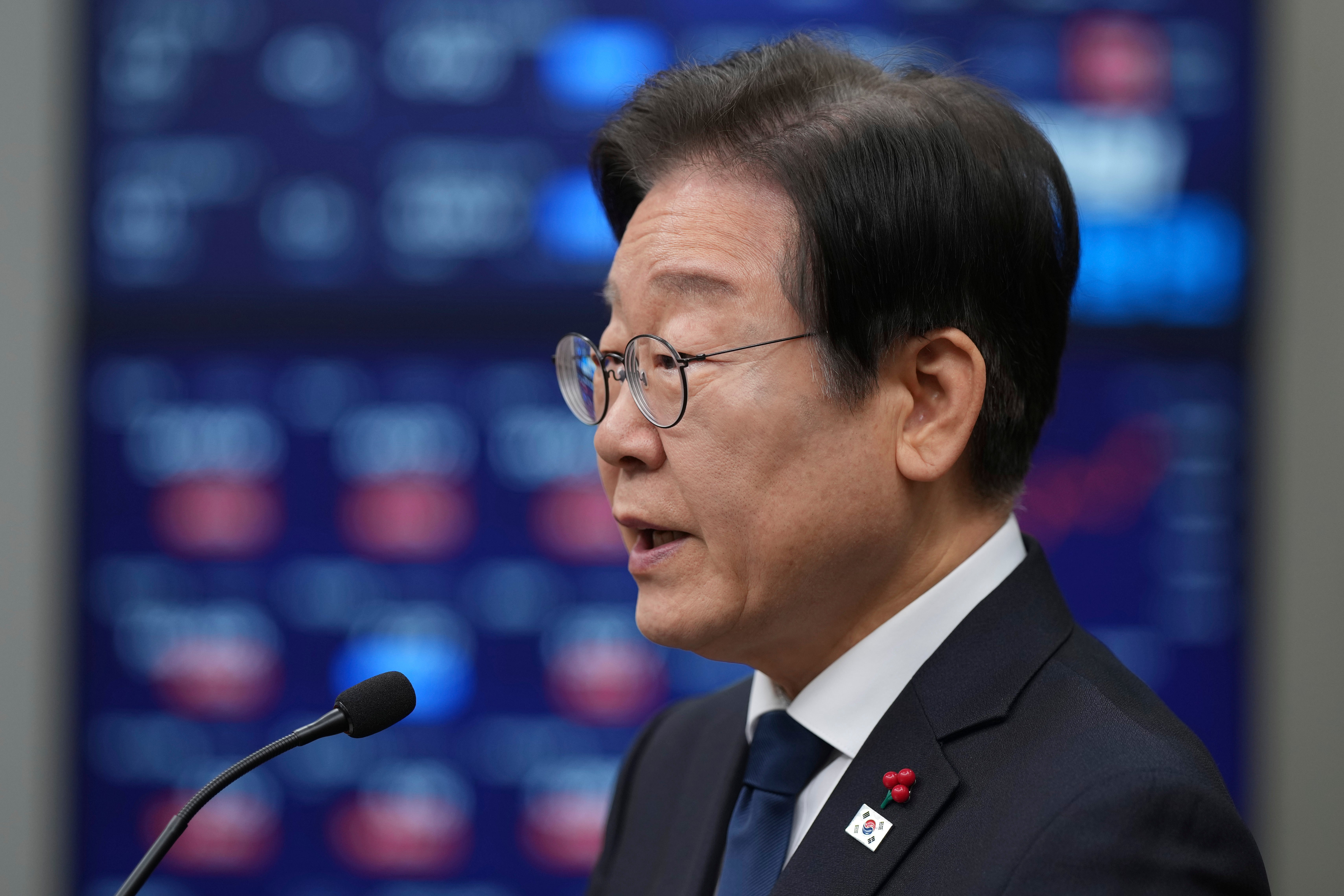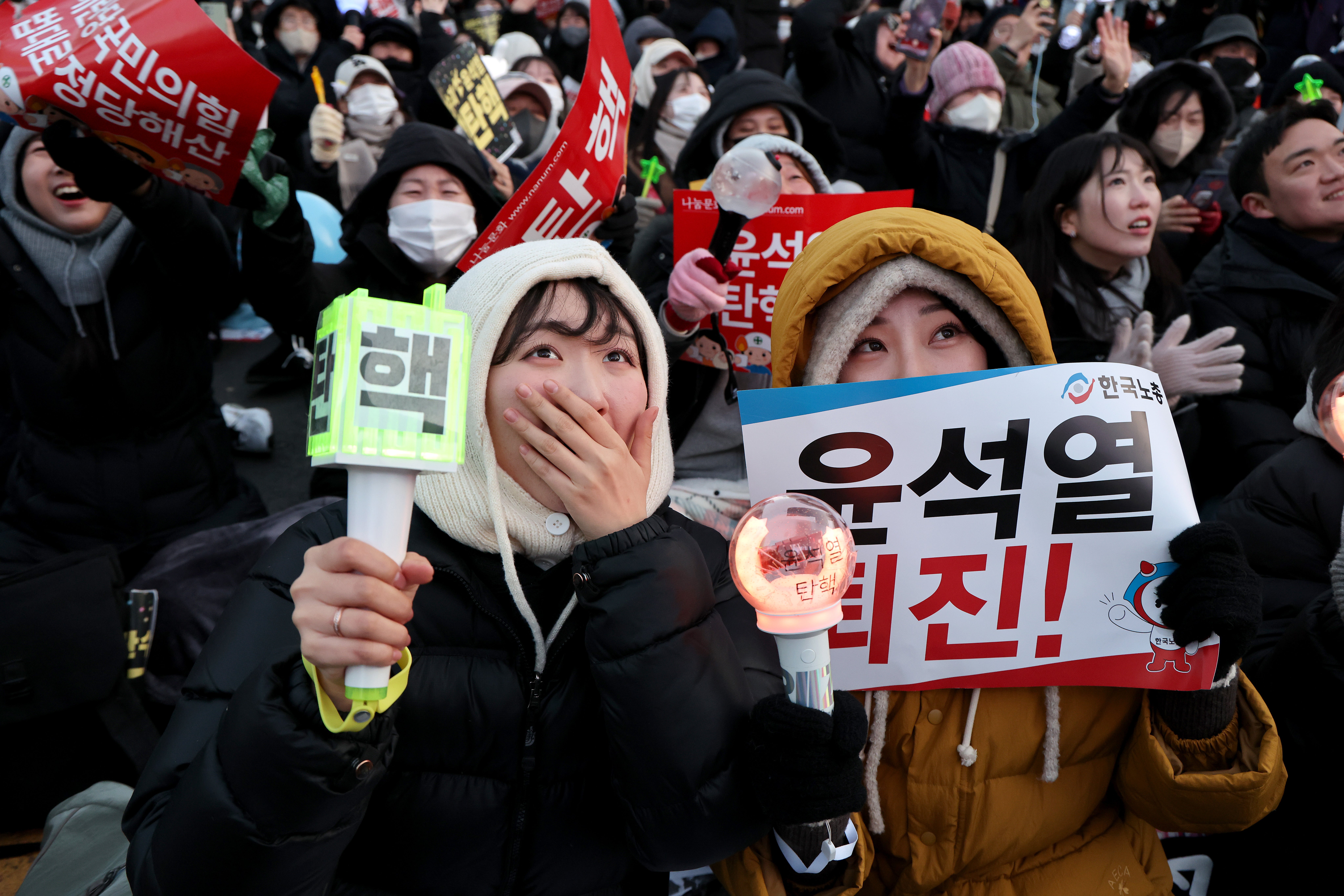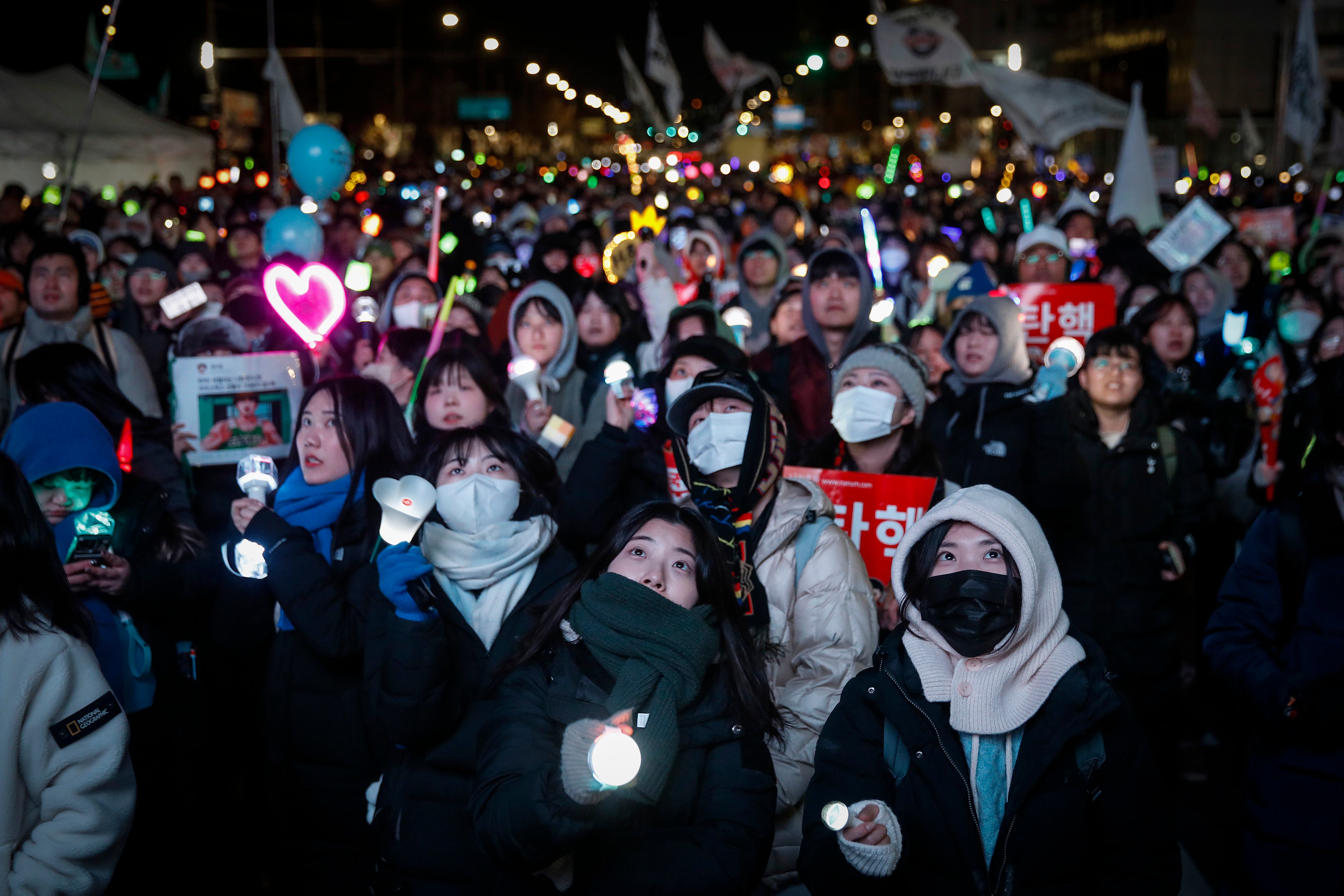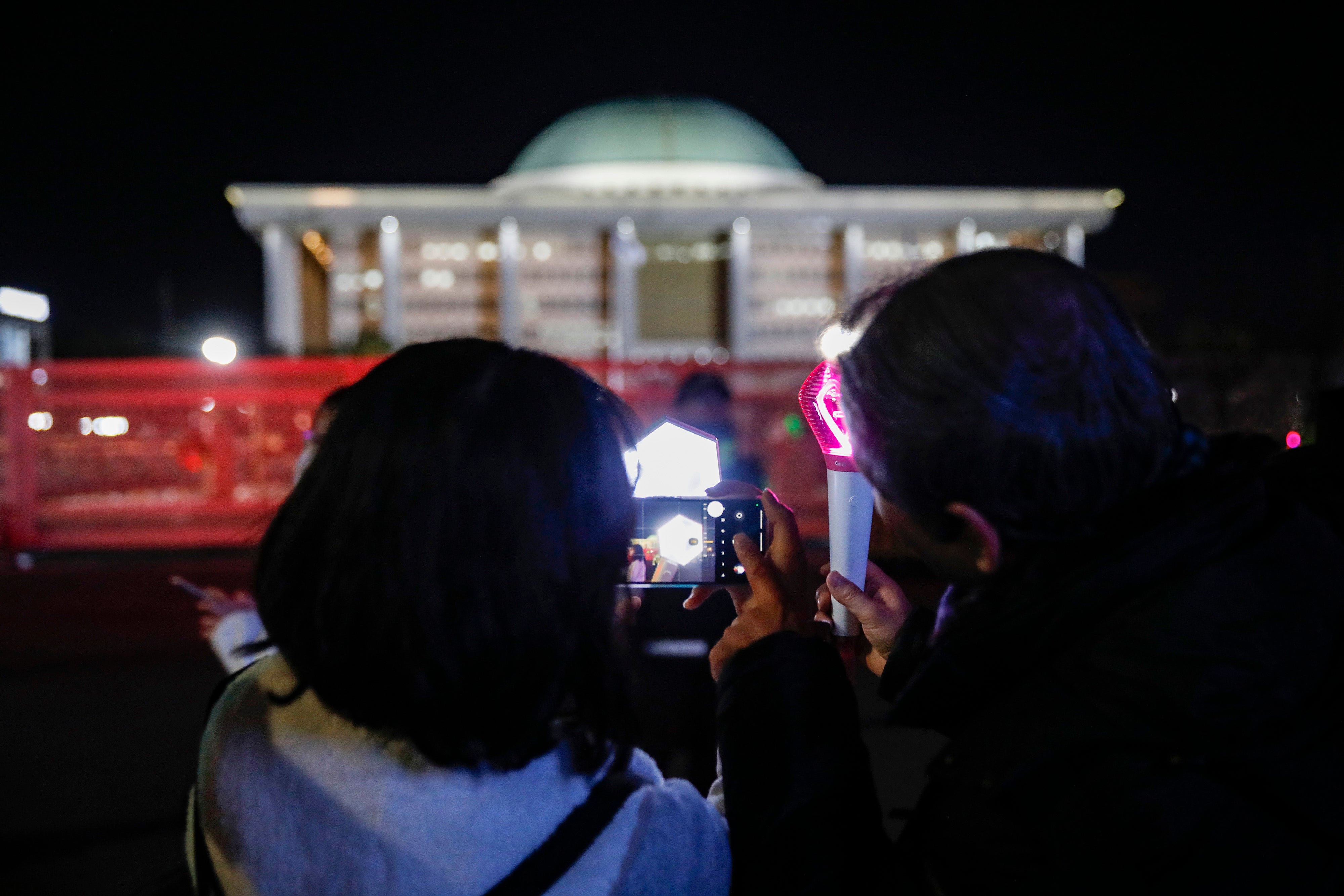Your support helps us to tell the story
From reproductive rights to climate change to Big Tech, The Independent is on the ground when the story is developing. Whether it’s investigating the financials of Elon Musk’s pro-Trump PAC or producing our latest documentary, ‘The A Word’, which shines a light on the American women fighting for reproductive rights, we know how important it is to parse out the facts from the messaging.
At such a critical moment in US history, we need reporters on the ground. Your donation allows us to keep sending journalists to speak to both sides of the story.
The Independent is trusted by Americans across the entire political spectrum. And unlike many other quality news outlets, we choose not to lock Americans out of our reporting and analysis with paywalls. We believe quality journalism should be available to everyone, paid for by those who can afford it.
Your support makes all the difference.
South Korea’s main opposition party has decided not to impeach acting president Han Duck Soo, providing a critical lifeline to the country’s leadership amid continuing political upheaval over Yoon Suk Yeol’s short-lived declaration of martial law.
The news comes amid reports that Mr Yoon did not comply with a summons from prosecutors on Sunday. The authorities plan to issue another order as they investigate the martial law decree, the Yonhap news agency reported.
The Democratic Party, which holds a parliamentary majority, stated that further impeachment efforts could destabilise governance and deepen national “confusion”.
“Given that the prime minister has already been confirmed as acting president and considering that excessive impeachments could lead to confusion in national governance, we have decided not to proceed with impeachment procedures,” said Democratic Party leader Lee Jae Myung in a statement on Sunday.
This decision came a day after President Yoon’s impeachment, following his 3 December martial law decree, which lasted only six hours before being overturned by parliament.
The crisis has raised alarm domestically and internationally, with allies and markets seeking assurances of stability. Mr Han, a seasoned bureaucrat elevated to the role under constitutional provisions, moved swiftly to reassure South Korea’s partners and maintain the country’s diplomatic and economic footing.

Mr Han held a phone call with US president Joe Biden on Sunday to discuss the unfolding situation and regional security concerns, including North Korea’s nuclear threat.
According to statements from both governments, Mr Biden reaffirmed the “iron-clad commitment” of the US to South Korea, expressing confidence in the resilience of its democratic institutions.
“South Korea will carry out its foreign and security policies without disruption and strive to ensure the South Korea-US alliance is maintained and developed steadfastly,” Mr Han said in a statement issued by his office.
He also convened cabinet and National Security Council meetings, directing military readiness to prevent provocations from North Korea and tasking ministers with mitigating the economic fallout from the political turmoil.

The Democratic Party, which has been a fierce critic of Mr Yoon’s administration, emphasised the need for the swift resolution of the impeachment case, urging the Constitutional Court to expedite its review. The court has up to 180 days to decide whether to remove Mr Yoon from office or reinstate him.
“A prompt ruling is the only way to minimise national confusion and the suffering of people,” Mr Lee said during a televised address, further proposing a cooperative council between the government and parliament to stabilise state affairs during the interim period.
The special prosecution team handling the investigation into Mr Yoon’s failed attempt to impose martial law sent him a summons asking him to appear for questioning at 10am on Sunday but he did not show up, reported Yonhap.
Mr Yoon and a number of senior officials face criminal investigation on potential charges of insurrection, abuse of authority and obstructing people from exercising their rights.
The prosecution plans to issue another summons on Monday, the report added.
Prosecutors also sought arrest warrants on Sunday of senior military officials, including the head of the Army Special Warfare Command and chief of the Capital Defence Command, Yonhap reported.
The impeachment vote against Mr Yoon followed his unprecedented deployment of troops and police to block a parliamentary session aimed at overturning his martial law decree. The measure, which marked the first imposition of martial law in the country for over four decades, was widely condemned as unconstitutional.
South Korean law permits martial law only during wartime or similarly grave emergencies, and opposition lawmakers accused Mr Yoon of attempting to suppress parliamentary functions unlawfully.
Mr Yoon, who has denied wrongdoing, described the martial law declaration as a warning to what he called “anti-state forces” within the Democratic Party. “I will fight to the end,” he said in a defiant statement.
However, his actions led to significant political backlash, with key allies arrested, including his defence minister and police chief. Investigations into possible charges of rebellion are continuing, and Mr Yoon, while still immune from most prosecutions as president, faces potential treason charges. He has been banned from leaving the country.
Economic concerns have compounded the crisis. South Korea’s central bank pledged on Sunday to intervene decisively to stabilise financial markets, acknowledging heightened vulnerabilities in the current global economic climate. The Bank of Korea warned that this impeachment period presents greater risks than previous ones, given external uncertainties such as increased global competition and challenges in key industries.
The announcement followed a week of volatility in the markets, triggered by Mr Yoon’s declaration of martial law and subsequent impeachment.

Mr Han’s appointment as acting president has been met with cautious optimism internationally. Philip Turner, a former New Zealand ambassador to South Korea, said Mr Han’s experience and reputation will provide some reassurance to the country’s allies.
“He is capable, experienced, and well respected in foreign capitals,” Mr Turner said, adding that while South Korea’s professional bureaucracy is expected to maintain foreign policy continuity, the lack of a permanent leader could create difficulties in providing clear direction.
Mr Lee, the Democratic Party leader who has emerged as a frontrunner to replace Mr Yoon should the court rule against the president, called for investigations into all individuals and institutions involved in the martial law decision.
“An independent investigation by a special prosecutor must begin without delay,” Mr Lee asserted, referring to a recent parliamentary motion authorising such a probe.

As the Constitutional Court prepares to deliberate, South Korea faces months of uncertainty. If Mr Yoon is dismissed, a presidential election must be held within 60 days.
Meanwhile, the acting president is tasked with steering the nation through this volatile period, maintaining critical alliances, and navigating economic challenges. International partners are closely monitoring the situation, with Mr Biden and other leaders reaffirming their commitment to the US-South Korea alliance as the cornerstone of regional stability.
While the Democratic Party has tempered its impeachment drive, citing the need for national stability, its leaders remain focused on resolving the crisis and restoring trust in the government.
“The National Assembly and government will work together to quickly resolve the crisis that has swept across the Republic of Korea,” Mr Lee said. However, some within Mr Yoon’s People Power Party have accused Mr Lee of overstepping his authority in state matters, setting the stage for further political tensions in the weeks ahead.
Additional reporting by agencies

